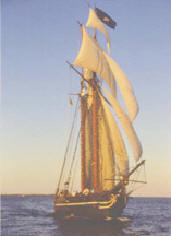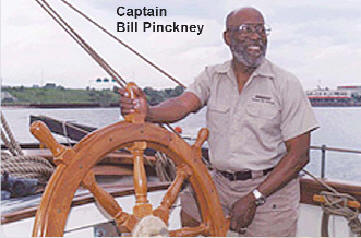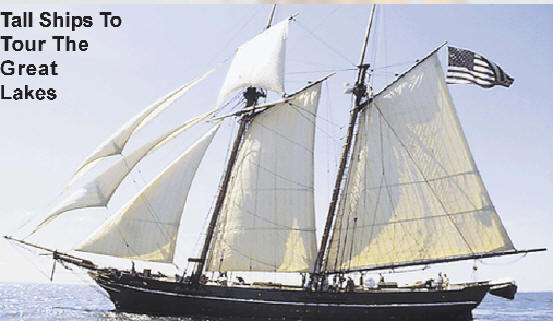|
Tall Ships Touring, Racing Great
Lakes |
||
| By Captain Thom Burns Several Tall Ships will be making port calls this summer in the Great Lakes. Most of them, including Amistad, are near replicas. They typically draw huge crowds and offer educational opportunities as well. The truly lucky will experience these opportunities underway. The Freedom Schooner Amistad, a re-creation of the famed Spanish cargo ship taken over by 53 would-be slaves from Africa, will lead the summer tour of the Great Lakes. Amistad in particular offers lessons on the human spirit and perseverance. She is also under the command of Captain Bill Pinkney, the first black man to circumnavigate the world alone. I last visited Amistad when she was little more than a keel and some bones in Mystic Seaport in Connecticut. I have visited with Captain Bill several times at boat shows over the years. He will light up your day with his enthusiasm and story telling. He is a former Chicago school teacher who has an impressive aura of a man really doing what he likes to do. Sail a ship with character and some of his own history. “You will not see a rough 1839 cargo ship,” said education director, Andrea Leiser. “You will see an icon of freedom.” The point of the reproduction vessel, the goal of the floating museum is to start dialogue about race relations which will promote reconciliation and harmony among races. "We thought it was a great opportunity to bring in the Amistad and its mission, which is to bring together diverse groups in the community to talk about race relations," said Mark Knierim, spokesman for KeyBank of Toledo, one of the major sponsors. The story of the Amistad, which unfolded in April, 1839, was retold Hollywood-style in 1997 with Steven Spielberg’s movie, Amistad. Though educators have argued its nuances and depictions of some of the characters, the basic story remains the same.
|
 In April, 1839, despite
international laws barring the slave trade, dozens of Africans were taken
from their Sierra Leone home and smuggled into Cuba. In Havana, 49 men and
four children were sold to two Spaniards and then forced onto the Spanish
schooner La Amistad, where they were to be taken to Puerto Principe - a
short trip away. In April, 1839, despite
international laws barring the slave trade, dozens of Africans were taken
from their Sierra Leone home and smuggled into Cuba. In Havana, 49 men and
four children were sold to two Spaniards and then forced onto the Spanish
schooner La Amistad, where they were to be taken to Puerto Principe - a
short trip away.Three days into the trip, one of the captives, Singbe Pieh, later known
as Joseph Cinque, used a nail to pry open his shackles. Using cane knives,
the Africans took over the ship, killing the captain and the cook; they
lost 10 of their own men.
For more info: |
|

